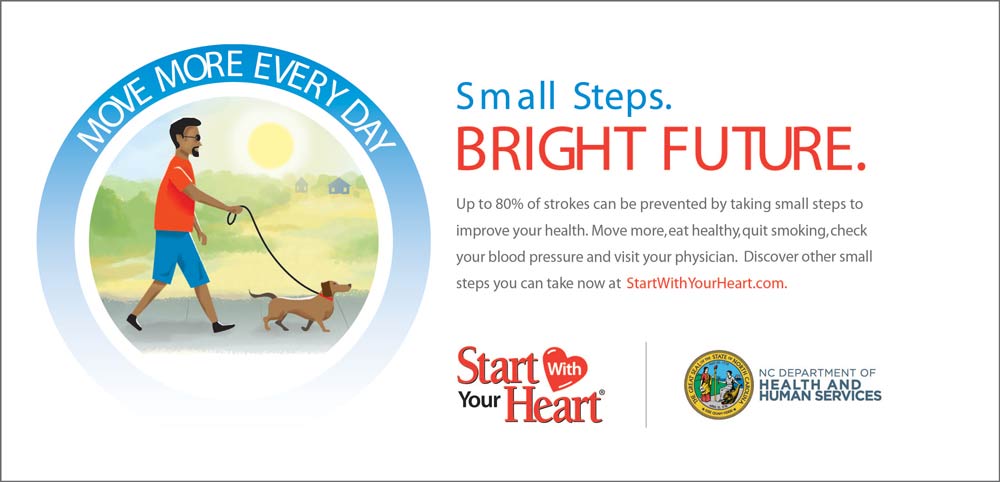Stroke Advisory Council
The Stroke Advisory Council was established in 2006 to advise the Justus-Warren Heart Disease and Stroke Prevention Task Force on the development of a statewide system of stroke care.
North Carolina is in the country’s Stroke Belt, an 11-state region where studies show that since 1940 the stroke death rate has been substantially higher for the general population than it is in other areas of the country. Furthermore, the eastern counties of NC are part of the “Buckle” of the Stroke Belt (the coastal plains of Georgia, South Carolina and North Carolina) where stroke risk is two to three times greater than the national average. However, clusters of high stroke mortality exist beyond the Stroke Belt, and variation exists within the Stroke Belt. Although stroke death rates have declined for more than four decades, the decrease has slowed in recent years. In fact, the stroke death rate increased by 2% among adults ages 35-64 in North Carolina.
Members of the Stroke Advisory Council are appointed by the Task Force and include representation from the North Carolina Medical Society, North Carolina College of Emergency Physicians, Old North State Medical Society, American Heart Association/American Stroke Association, the North Carolina Healthcare Association, the North Carolina Association of Rescue and Emergency Medical Services, and Area Health Education Centers.
The Task Force may also appoint other members to provide expertise beneficial to the Council. In addition, the Council benefits from the active participation of numerous partners and stakeholders.
One of the first tasks of the Stroke Advisory Council was to provide recommendations to the Task Force regarding the development of a statewide system of stroke care, and the Council submitted the Preliminary Findings and Recommendations Report in January 2007.
In 2008, the Stroke Advisory Council developed the Stroke System of Care Plan for North Carolina which provided a comprehensive and integrated approach to addressing the burden of stroke in North Carolina.
In 2016 the Stroke Advisory Council developed and refined a list of priorities and formed three work groups to address those priorities:
- Integrating and Accessing Care
- Prevention and Public Awareness
- Post-Stroke Health
Work groups addressed identified needs in the prevention of stroke and in the care of those who experience stroke. Work group chairs reported on their progress at quarterly Stroke Advisory Council meetings.
For more information on meeting proceedings, see meeting minutes and presentations.
In 2019 the Council formed a Stroke System of Care (SSC) Development Team that created a framework to delineate and strengthen stroke care throughout the state. The Team established five sections of the SSC: Stroke Prevention, Stroke Care, Post-Stroke Care; Advocacy and Health Equity are the fourth and fifth sections and affect each of the other three sections. Throughout the year the Team worked to identify strategies in each section. Next, they gathered resources to support each strategy. Team members and work group members identified several strategies that require further investigation by experts and that would benefit from wider discussion. In November 2019 the Plan Development Team released the Stroke System of Care strategies, resources and Action Plan that guide the Stroke Advisory Council work through the formation of ad hoc work groups.
Stroke System of Care Work Groups
Stroke Advisory Council Work Groups reflect components of a comprehensive Stroke System of Care which is depicted below. The long-term objectives of the comprehensive Stroke Systems of Care are to prevent stroke and to improve stroke care by increasing communication and coordination with everyone involved: individuals who have suffered a stroke, family members, health care professionals, community partners and legislative entities.








In 2019 the American Stroke Association (ASA) released an Update on its Recommendations for the Establishment of Stroke Systems of Care. These recommendations span primordial and primary prevention, acute stroke recognition and activation of emergency medical services, triage to appropriate facilities, designation of and treatment at stroke centers, secondary prevention at hospital discharge, and rehabilitation and recovery. ASA first issued policy recommendations for the development of stroke systems of care in 2005. A subsequent statement in 2013 issued a policy statement on the interactions within stroke systems of care. A new guideline on prevention was also released: 2024 Guideline for the Primary Prevention of Stroke: A Guideline from the American Heart Association/American Stroke Association.
The Stroke Advisory Council will focus on several strategies in the Stroke System of Care by creating new ad hoc work groups.Contact us at info@startwithyourheart.com to join a work group.






